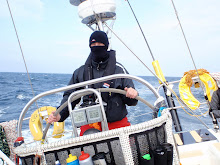 We have eventually arrived in San Francisco after a brutal leg of the race. I feel completed wasted. For this blog, rather than focus on the whole of Leg 5 I am going to recount events from a 72hr period when we were circa 3500 miles into our crossing and maybe this will give you an insight into why we’re all pretty pleased to be on dry land for a while.
We have eventually arrived in San Francisco after a brutal leg of the race. I feel completed wasted. For this blog, rather than focus on the whole of Leg 5 I am going to recount events from a 72hr period when we were circa 3500 miles into our crossing and maybe this will give you an insight into why we’re all pretty pleased to be on dry land for a while.Welcome to hell…
It had rained for nearly a week non-stop. Every watch we headed out into the lashing rain. My clothes, supposedly the best gore-tex waterproofs were soaked through and the wind from the Arctic was freezing. The wind was however dropping off rapidly and the mood was becoming more and more sombre as our boat speed dropped as did chances of an early arrival. At midnight I went off watch, cold wet and tired and wrote a few emails expressing my dislike for the Pacific, particularly bemoaning the lack of wind.
20 minutes later I was enjoying one of the now very few comforts on board, my warm sleeping bag, where I would try desperately to get about 2 and half hours sleep before heading back out into the cold. Or so I thought.
Matt came through to the crew area and I was woken up saying the opposite watch needed a hand on deck. I didn’t really understand what was happening at first as the weather did not sound horrific from below deck. The predicted gradual build up of wind though did not happen. We went from about 6 knots of breeze to 50 knots in the space of about 15 minutes. It was soon gusting as high as 65 knots (peaking at 72). Bearing in mind that on the Beaufort scale a ‘Hurricane’ starts at 64 knots of wind, this was a very serious low pressure hitting us.
 Spray and rain were no-longer discernible and neither was the direction in which it was coming from. Bitterly cold foam and white spray began filling the air as we wrestled with the mainsail and headsails. This became a near impossible task as the wind created a monstrous sea state. Huge huge waves and a very confused sea state rocked the boat dangerously. As a crew we had developed really good communication skills when we go through sail evolutions. It was completely useless though now as it was so loud that people could not be heard shouting at the top of their voices only 6 feet away. As the bitterly bitterly cold booming wind set in and we finally managed to get the sail plan down I eventually headed back to my bunk. As I left deck I saw we were still doing six knots even with no sails up! It would only be an hour or so before I kitted back up and headed back out for my on-watch…
Spray and rain were no-longer discernible and neither was the direction in which it was coming from. Bitterly cold foam and white spray began filling the air as we wrestled with the mainsail and headsails. This became a near impossible task as the wind created a monstrous sea state. Huge huge waves and a very confused sea state rocked the boat dangerously. As a crew we had developed really good communication skills when we go through sail evolutions. It was completely useless though now as it was so loud that people could not be heard shouting at the top of their voices only 6 feet away. As the bitterly bitterly cold booming wind set in and we finally managed to get the sail plan down I eventually headed back to my bunk. As I left deck I saw we were still doing six knots even with no sails up! It would only be an hour or so before I kitted back up and headed back out for my on-watch…A few hours later, and in the light of day, I’d never seen anything like it. It was the most ferocious display of nature I’ve ever seen (the wind was still peaking at 60 knots). There was just so much water everywhere, waves were sweeping people down the deck of the boat. It was not overly surprising when we got the awful news that the skipper of Hull and Humber had broken his leg after being swept onto one of the stanchion posts. Spirit of Australia were sent to their aid and accompanied them to a rendezvous with the Japanese coast guard.
We had a couple of near knock-downs on board Jamaica, one or two when I was helming which was scary as it allowed you to really feel how powerful the waves were. We had almost a foot of water INSIDE the boat at one point due to a wave crashing through the companion way hatch.
Amid all the happenings, news then came through that California’s EPIRB had gone off – an emergency location device. They were not responding to any radio or satellite calls so we were told by the race committee that we would have to go to their last reported position to investigate. We eventually caught up with them to find a pretty grim situation. 2000 miles form the nearest land they had been rolled a full 130 degrees. The mast was broken into 3 pieces. There was a serious medical emergency. They had no communications equipment and no navigation equipment and the weather was not letting up.
 The Coast Guard plane was then called from Midway (US owned island) to assist in the situation. Eventually through liaising with us they located California and managed to drop a handheld VHF radio to them, which would allow them to speak with the boat and coordinate the medical evacuation and provide any other assistance they could. The patient on board California finally stopped bleeding from his head wound after 15hrs but a medical evacuation was still required.
The Coast Guard plane was then called from Midway (US owned island) to assist in the situation. Eventually through liaising with us they located California and managed to drop a handheld VHF radio to them, which would allow them to speak with the boat and coordinate the medical evacuation and provide any other assistance they could. The patient on board California finally stopped bleeding from his head wound after 15hrs but a medical evacuation was still required.Also in the area fortunately was a huge merchant vessel, the Nord Nightingale. They had been called to assist as well (many hours ago in fact) and so were now approaching fast. When they arrived at the scene it was late afternoon and it was decided that they had to get the patient off quickly, as the transfer would be impossible in the dark. The rough sea state though made for a very risky boat-to-boat transfer and it was only due to the skill and patience of the crew from both California and the Nord-Nightingale that he was successfully transferred to the tanker just before darkness really descended.
It was hard to believe that whilst all this was happening we also heard news that Singapore had been knocked down severely. They had had 3 people washed overboard although all were attached to lifelines and so were safely brought back on board. They did however suffer structural damage to the boat - the steering wheel was buckled and the helming frame ripped off. The companion way roof was also ripped off which meant they were taking on a lot water each time they were hit by a wave. They were also called to come to our position but they would have repairs to do of their own first before they arrived on the scene.
24 hours later the wind finally began to calm as did the sea state and so we were able to do a fuel transfer to California. We could only afford to transfer them about two days fuel since we had had a diesel leak of our own on board Jamaica. The other boats which were catching up with us (Singapore was now only a matter of hours away) would also be doing fuel transfers which would allow California to motor most of the way to America.
By this stage of the race, Edinburgh had a badly damaged spreader (meaning that their mast was also dangerously close to collapsing as well). Team Finland had also been diverted back to Japan because of a water maker problem and so the whole fleet just seemed to be taking a hammering from the Pacific.
 For me personally, I had had no sleep for nearly 3 days. I had been sea sick, badly at times. I was completely exhausted.
For me personally, I had had no sleep for nearly 3 days. I had been sea sick, badly at times. I was completely exhausted.It would now only be a brief respite though as the next low pressure was on its way. This time the NOAA (National Oceanographic and Atmospheric Administration) had officially classified it as a Hurricane.
Pack your bags guys, we’re heading back to Hell.
Pack your bags guys, we’re heading back to Hell.






No comments:
Post a Comment
Just use the ANONYMOUS PROFILE if you are having a problems with other ones.